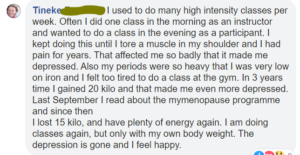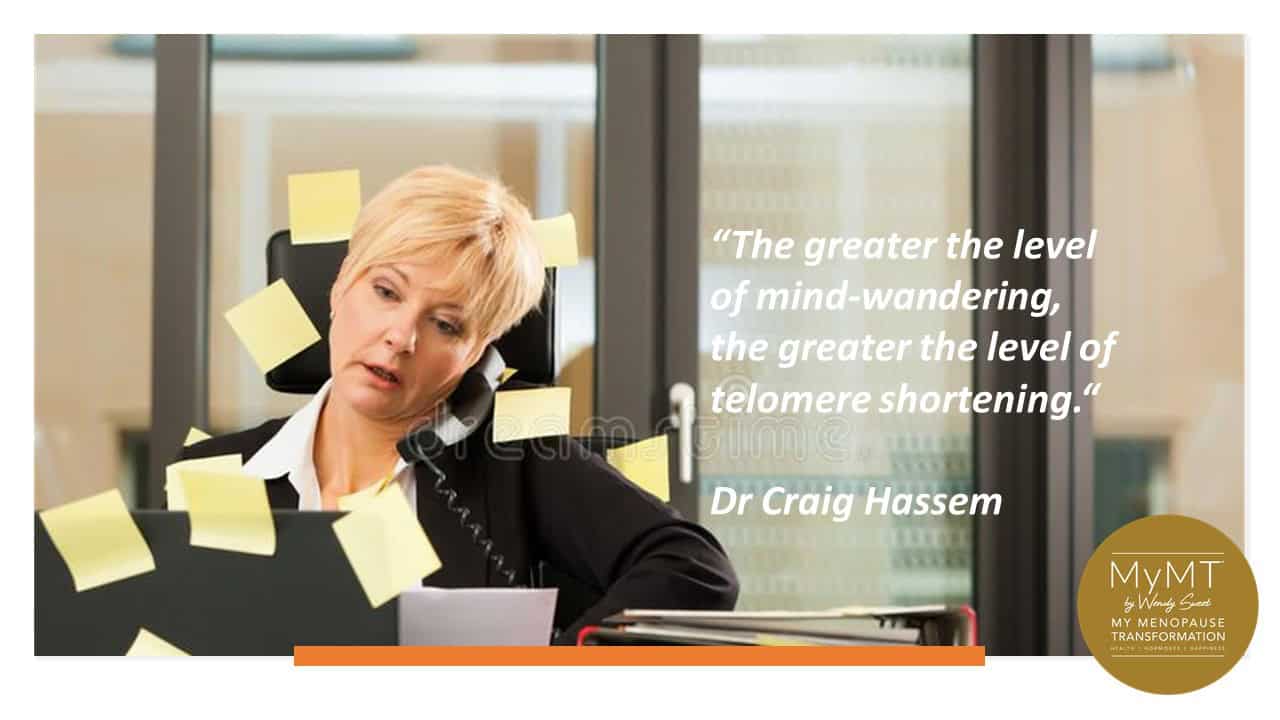There’s a small book sitting on my bookshelf that I treasure. Given to me by my retiring PhD Supervisor when he was cleaning out his office, it reminds me of my sport psychology lectures when I attended Otago University’s Faculty of Physical Education, in the 1990’s. As a naive adult student re-training and moving on from my original career as a nurse, I had never heard of Professor Mihalyi Csikszentmihalyi and his pioneering work in sports psychology and the concept of ‘flow’ and the relationship of this state to our anxiety levels and happiness, both at work and in the home. Nor did I know about the Mindfulness research from Dr Craig Hassem, and what he has to say about ‘multi-tasking’. As a generation of women who know all about multi-tasking, I’m excited to share this with you.
“The best moments in our lives are not the passive, receptive, relaxing times… The best moments usually occur if a person’s body or mind is stretched to its limits in a voluntary effort to accomplish something difficult and worthwhile.” ~ Mihaly Csikszentmihalyi (1990, p. 3)
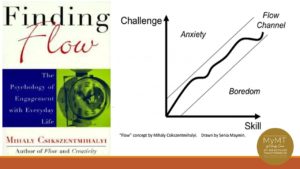
Mihaly Csikszentmihalyi discovered that people find genuine satisfaction during a state of consciousness called Flow. When they ‘find-flow’ they are generally happier. Athletes know all about this state which is generally described as being ‘in the zone’. In this state they are completely absorbed in an activity, especially an activity which involves their creative or their performance abilities. During this “optimal experience” they feel “strong, alert, in effortless control, unselfconscious, and at the peak of their abilities.” Csikszentmihalyi insists that happiness does not simply happen – it’s a habit that is learned and like any activity that we want to become good at, must be practiced … daily.
Feeling ‘happy’ or ‘in flow’ must be prepared for and cultivated by each person. This is achieved by not only setting challenges that are neither too demanding nor too simple for ones abilities, but also concentrating on the task at hand and therefore, removing ‘multi-tasking’.
Finding ‘flow’ helps us to reduce our anxiety. It also helps us to manage the brain’s changing hormonal balance as we move through menopause. With the changes to our reproductive hormones, there are also changes to our mood and motivation hormones leaving many of us feeling … well … unhappy. It’s no surprise that women in mid-life are one of the highest groups to be prescribed anti-depressants.
There are a couple of factors that affect our ‘happiness hormones’ as we age – firstly, there are changes to our serotonin and dopamine levels as we lose oestrogen. As those of you who are on anti-depressants already know, declining serotonin can send your moods on a downward spiral.
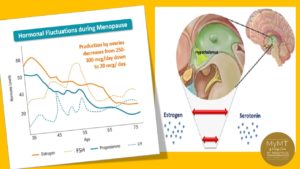
Secondly, our nervous system is changing as it ages too. As we lose the role of oestrogen on the outer sheath of the nerves, this makes them more ‘irritable’ and the more multi-tasking we do, the more our nerves have to fire-up to send signals to muscles. But the faster pace of these signals depend on oestrogen. As such, we find that we can get muddled and our heart rate and blood pressure increases in response to the pace of the nervous system, so we feel more anxious as well.
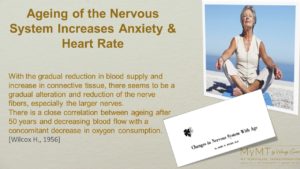
I was reminded of this with my virtual conference back in April this year. Not able to fly to beautiful Melbourne (which is still in lockdown), I was sitting at my kitchen table instead. I did get the washing folded and dinner prepared whilst I listened. But I stopped the multi-tasking when Mindfulness researcher Dr Craig Hassed began talking. I sat down and concentrated on his wisdom instead. As a Mindfulness researcher and senior lecturer at Monash University in Australia, his research and words took me by surprise:
“The greater the level of mind-wandering, the greater the level of telomere shortening.”
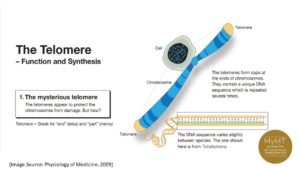
I know from my women’s healthy ageing research, that shortened telomere length (the hard-caps on our DNA) are associated with worsening inflammation and numerous diseases of older-age. The faster these precious little hard-caps shorten, the more wrinkles we get, the more inflamed we feel and for those of you navigating menopause, your symptoms become worse as well. Thank you for the reminder Dr Hassed. Because as mid-life women with a lot going on in our lives, we all have busy-brains that wander a lot as we try and fit everything that we have got going on, into our day. I’m talking from experience here.
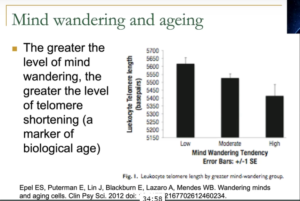
Dr Hassed’s presentation on ‘Why Mindfulness Matters’ was fascinating and as he spoke, I was reminded of the strategies that Professor Csikszentmihalyi wrote about back in the 1990’s, about ‘Finding Flow’. I now talk about these strategies in the MyMT programmes for the women who have a lot going on in their lives. When we are multi-tasking, we aren’t absorbed in the concept of flow nor are we being ‘mindful’ and ‘present’ in what we are doing at the time – both at work and in the home.
Practicing mindfulness, reducing distractions and finding flow are important for a number of reasons. “Ancient approaches to health have been, in essence, holistic”, mentioned Dr Hassed. Well-being, illness and healing were strongly connected to the mind, society, morality, spirituality and ecology. In the past, no part of our life and experience could be walled off from any other. In the 19th and 20th centuries, however, as societies changed and became more focused on industry and material belongings, this holistic view has been lost.
Learning that I had to stop rushing around and having so much on my plate as I moved through menopause was a complete revelation to me at a time when my symptoms were over-whelming me. For an active, on-the-go mother juggling parenting, studying, a university career and at the time, caring for my elderly mother when I could, slowing down my mind and body in a purposeful way without my mind wandering and without multitasking was difficult to do. Finding ‘flow’ was even more difficult. My mind always had a lot going through it.
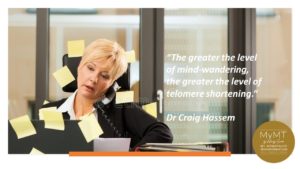
Having had that experience myself, it’s why in both of the 12 week MyMT™ programmes, I’ve developed a module called ‘Mind Your Mindfulness’. In this I give women the background on their stress, health and anxiety and why, every now and again, we need to practice mindfulness and ‘find flow’ by blocking out all the extraneous ‘noise’ in our lives and focus on the task at hand. If we can build up to doing this every day, then the results are amazing – especially for those of you who have work, family, ageing parents to care for and you are trying to fit in exercise and everything else as well. It’s tough.
This module takes women on a journey through the evidenced mind-body psychological strategies that not only help their hormones to stay balanced, but also improves their health and their happiness. Somewhere along the way over the past decades many of us lose sight of ‘who we are’. Our body shape has changed, our health has changed, our stress levels have increased and our view of how we want to live our life may have changed too. As our mood hormone, serotonin, lowers due to changes in oestrogen, it’s a time when menopause melancholy can overtake and overwhelm us. It’s hard to stay motivated some days, but as my favourite behavioural psychologist the father of sports psychology, Professor Mihalyi Cszikszentmihalyi says,
“The first step in any transformation is to gain a clear understanding of one’s self – the image you develop about who you are is set in your consciousness. If you want to change your sense of self, then at first, you must come to know yourself. Once we realise what our demons are, we can set a path towards achieving change.”
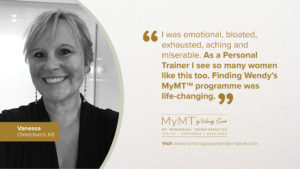
How Mindfulness Helps with Stress and your Weight Management
Many of the fabulous women who join me on the MyMT™ programmes feel stressed and emotionally drained – no surprises there when you can’t sleep all night. Busy with parenting, careers and caring for others and busy trying to keep the wheels from falling off in the home, it’s tough. But many are exhausted because they arrive in menopause and not sleeping night after night wears them down. As Melbourne SwimWorld Manager, Anna said, “I was so exhausted, but we women just have to keep on going don’t we?” I felt the same as well. Life becomes an enormous struggle and for many, when the weight starts to creep on, we try to exercise harder as well. 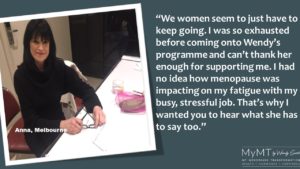
Practicing mindfulness can help you reduce your stress because you learn to develop an awareness of what is going on in your everyday world.
Nestled in Buddhism, mindfulness is an ancient practice that allows you to ‘be in the moment’. In this context you begin to become aware of the thoughts that trigger your thoughts, the emotions that can turn into conflict, irritability or frustration, the physical signs that your body isn’t coping (not sleeping, more hot flushes and sore joints) and the subsequent behaviours that arise from the stress you are feeling.
Mindfulness strategies help to control your nervous system.
For so many women with busy, active lives there are hundreds of thoughts going through our brain every day. These thoughts can be positive and negative – this means that the nervous system which sends messages around your body stays active all day long and into the evening too. If we are struggling with stress and having negative thoughts, then the part of the nervous system that dominates, is the Sympathetic Nervous System. This controls your ‘fight or flight’ responses.
Every time you are thinking, moving, and/or exercising, your body has fired up the part of your nervous system called the Sympathetic Nervous System. This is the system that controls thoughts and actions. It’s our stress-response system, our fight or flight response system. But here’s the thing – our stress-responses weren’t designed to stay activated all day long and into the evening. When this happens, it throws out the balance of your lovely, relaxation, calming nervous system – the Para-Sympathetic Nervous System.
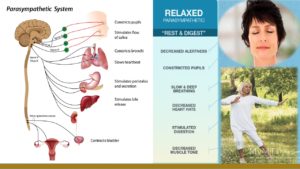
When the Sympathetic Nervous System dominates your internal environment, this throws out the balance between the two nervous systems – and this leads to increased stress, anxiety, heart palpitations, irritability, weight gain and a liver, gallbladder and gut that can’t digest food very well. Over time, your sympathetic nervous system becomes the dominant ‘go-to’ system. Many of you feel ‘wired’ all the time. This is why.
When your sympathetic nervous system dominates, your food isn’t being digested well either. Wrong choices with food occur and many of you may then feel grumpy, irritable, bloated and get easily frustrated. Yes, I felt all those things too. I had no idea that my sympathetic nervous system was dominating and therefore, contributing to weight gain, sore joints, increased anxiety, palpitations, mood swings and worsening inflammation. As inflammation increases in muscles and joints, so too do injuries occur more frequently. Lucinda, from Australia, was the same and her story is HERE.
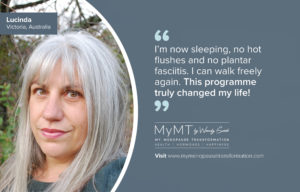
As we move through menopause and lose oestrogen, our nerves change in structure and function. With our nerves relying on oestrogen to help to send signals along the nerve axon or pathway, when oestrogen levels decline, there are changes to the nerve walls. Our blood vessels rely on oestrogen too. Oestrogen helps the elasticity of our blood vessels. Both these systems are intricately connected and as we move through menopause and we lose the role of oestrogen, the changes on these two systems alone can affect the quality of life for many women. We can feel more anxious, more wired and tired and we can feel hopeless, un-motivated and more easily over-whelmed. For women who have coped all their lives, these feelings can be challenging.
This is why, many of us need to re-balance up the competing nervous systems and make time in our day to dampen down the dominant sympathetic system and allow our calming para-sympathetic nervous system to dominate as well. How we achieve this is to find time alone to practice some mindfulness strategies and try to ‘find-flow’ in the activities we are engaged in. Getting rid of distractions is important.
How do we become more ‘mindful’?
Mindfulness starts with self-awareness. So, the first thing to begin to practice, is to pay close attention to what you do every day. then begin to notice how you feel in different activities, places, times of day and with different people. When you reflect on how you feel in different circumstances, then this helps you to identify when and why you feel a bit stressed and when to activate your calming para-sympathetic nervous system. Self-awareness is the start of change and it takes practice to become more conscious of this aspect of our lives.
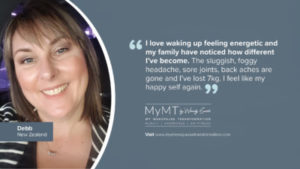
When you become more self-aware, only then can you start to experiment with different alternatives for changing aspects of your daily life, that no longer work for you, e.g. eating at different times, getting up earlier or going to bed earlier, having some ‘alone time’, practising mindfulness strategies such as paying attention to your breathing and movement.
You can practice your mindfulness anywhere at any time. Mindfulness isn’t just about visiting a yoga class or pilates studio. To me mindfulness is what you practice in your every-day activities so you become more mindful. It helps you to slow down, switch off and become ‘present’. It helps you to ‘find flow’.
Once you understand when you feel most anxious or stressed, then you can begin to add mindfulness strategies into your day. I like mindful walking, mindful swimming and mindful breathing and I encourage women to find time to do these activities when they can.
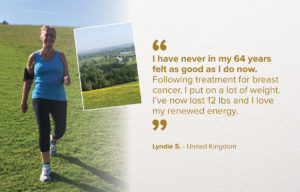
Mindfulness strategies help you to slow down – mentally and physically. In Asian meditative traditions mindfulness practices help to release what is termed “monkey mind.” This is the distracted thinking whereby it’s too easy to focus on past, or future events or things that are irking us as we go about our day to day lives.
I like that.
I can’t wait for you to join me on the programmes if you can. 2020 is turning out to be an incredibly challenging year for everyone let-alone having to cope with menopause symptoms too. The programmes are ON SALE with NZ$50 off until the end of October. Please use the promo code JOIN MYMT to access your savings when purchasing and yes, monthly payments are available too.
